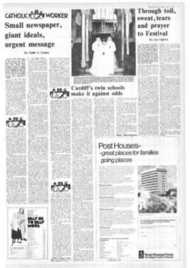Page 5, 1st June 1973
Page 5

Report an error
Noticed an error on this page?If you've noticed an error in this article please click here to report it.
Tags
Share
Related articles
Y.c.w.
Y.c.w.
Feuds Foil Calls For Ceasefire
The Centenary Of A Great City
Glasgow's Ca 1 °lw Poor
The parish lives or the city dies
From Glasgow to Rio di Janeiro: from Manchester to Joharnesburg, the problem is the same: the city grows to decay and with it loneliness. Yet an old cure remains, a cure as old and potent as Christianity — the cure of individual souls.
How is this cure to be best effected? By seminars? By surveys? By commissions? By pastoral letters? By — idvin k the mark — leading articles? Hardly. But a writer of the calibre of Nobel Prize winner Heinrich Boll does supply a clue when he calls the parish priest "the only important man. For the truth of our lives in the rest of the 20th century and beyond is simple: the parish lives or the city dies. And the parish lives ,first of all in the quality of its priests, in their loving kindness, their willingness to knock on any door at any time — even if it means interrupting the aforesaid telly epilogue featuring the next auxiliary bishop but one. It is from priests who go out to meet the people, the people of God, transient and settled, that the parish takes its life. All other ways, radio, television, print, are merely substitutes for that person to person meeting — however awkward, however circumscribed by the wealth or poverty of the context. With such priests — and vocations fall where such priests are not prayed for or worse not thought necessary — the whole parish becomes a brotherhood and sisterhood of charity offered to all in spiritual or physical need. Christians in the community parish become bridgemakers between the eternally spiritual and the immediately secular. They number the empty flats and houses in their parish area being held against a rise in property values and urge their local authorities to make them available to the homeless.
They repair rundown property for the old and disabled. They have children. They foster them, They adopt them. They run playgroups for them. They visit the sick. They visit prisoners. They help to bury the dead They pray.
All these are done already and more by members of parish organisations such as the St. Vincent de Paul Society, the Young Christian Workers, the Knights of St. Columba, the Union of Catholic Mothers, the Legion of Mary, the Third Order of St. Francis, Lifeline.
In the living parish all organisations from the parish council down should be animated by the thought of Pope John, that parish priest writ large, who said: "Let each one act of his own decision, of set purpose, from awareness of his duty, without external pressure." Nowhere is this ideal in action more crucial than in the Catholic parish school. Historically, these schools represent great sacrifices. Those sacrifices would be sterile unless their beneficiaries help others: the old, the sick, the homeless, the lonely.
Twenty years ago, writing to the Canadian Catholic Social Conference, Cardinal Montini, now Pope Paul, a parish priest writ shy perhaps, said: "In our tragically divided society does not the parish . . . function as a school of peace and social justice, inviting all the 'faithful without distinction, to unite with one another round its altar? Intellectuals and illiterates, poor and rich, employers and employees gather there together on the basis of Christian equality . . .
"Its spirit is that of the peace of Christ unto which we have been called to form one body which tolerates neither the shameless contrast of wealth and misery among the members of the parish cornmunity, nor the hypocrisy of a fraternity in church that would not have for its effect that of creating at work more fraternal social relations.
"Indeed does not the parish altar, the centre around which the most sacred bonds of union are formed invite each and every one who comes before it to make an examination of conscience in regard to his duties of _justice towards his brethren?" Does it? If it does not, then the parish dies. And with it the city.
blog comments powered by Disqus











